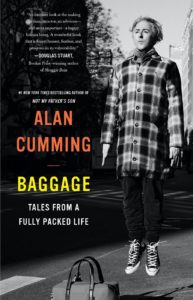
I remember reading long ago that actor Alan Cumming threw great parties. This bit of trivia tucked in my brain re-emerged as I dove into his second memoir, Baggage: Tales From a Fully Packed Life, published in October. Cumming does, indeed, give good parties, transforming rooftops and bars into spaces where drinks are quickly refilled, laughter abounds, and the buzz is heart-quickening. But Cumming is also a consummate host in his writing. He knows how to pace stories, pulling back before any turn too sentimental or nasty. A showman at heart, he eagerly shares details of his life while underlining his luck and hard work. “No one fully recovers from their past,” he writes. “You just learn to manage and prioritize it.” What he wants to tell readers is simple: Do not “buy into the Hollywood ending.”
Cumming’s first memoir, Not My Father’s Son, published in 2014, described growing up with a sadistic father who was the head forester of an estate in Scotland. In his new book, Cumming discusses his trajectory as an actor who has worked with Stanley Kubrick, donned heavy makeup for the X-Men movies (staying in costume while undergoing dental work because the studio timing required it), and triumphing as the emcee in Broadway’s Cabaret. Always in the background is the childhood he was able to escape at 16. In one compelling section of the book, Cumming compares the feeling of winning a Tony for best actor in a musical to being charged at and ultimately struck by a panicked deer during an organized hunt on the estate where his father worked. It is a perfect description because winning the Tony propelled him from being the toast of New York to international stardom.
What is striking is the range of movies Cumming has done. “I am eclectic in all manner of ways,” he writes, as if with a wink. “I am as engaged by Beckett as I am by Bananarama.” He has worked with the Spice Girls, dined with Gore Vidal, and befriended Monica Lewinsky. He offers the pugilistic dog and pony show at the Clinton White House during the impeachment hearings as a reason why the frankly sexual, no-hold-barred brazenness of Cabaret was such a tantalizing offering for 1998 Broadway.

Cumming got his start as a teen journalist in Scotland and made the decision to pursue acting to the disappointment of his then-publisher. The next 13 years are filled with Scottish triumphs as Hamlet and early roles in Cabaret, Circle of Friends, and Black Beauty. His first marriage to Hilary Lyon, who played Ophelia to his Hamlet, falls apart when he cannot reconcile fatherhood with his own painful upbringing. A long engagement to another Scottish actress also comes to naught. Throughout his personal crises, Hollywood will not stop calling. We watch as each set provides its own sense of family, functional and not, and the parties and acclaim that follow.
Cumming is not a chronological storyteller — he frequently returns to his younger days as more and more success calls. But there is also a good deal of joy in the book, which Cumming strives for and seeks out. Those curious about the lifestyles of the rich and famous will find revealing bits about Faye Dunaway and Liza Minnelli, but Cumming is not a mean tattler. Even the odious goings-on at the Vidal villa are presented with elan and analysis. The reader is left with the impression that Cumming is a tenderhearted man whose intelligence runs the show, even if, on occasion, his libido calls the shots. He meets the love of his life at last, and, Reader, he marries him.
So, will you know Alan Cumming any better after reading this book? Probably not, but you will learn about his world, about the nature of fame, and about what happens when the cameras aren’t rolling. You might get a little gossip, and a lot of laughs. In the epilogue, he writes that he “did more research on Alan Cumming … than for any character I have portrayed.” While he has access to the letters, photographs, and, of course, his memories, Cumming confesses he could also stalk himself on the internet. And so can we. After reading his description of winning the Tony in 1998, I found the clip of his acceptance speech, which felt like a bonus, a little treat. What else would be a treat? Wrapping the book, perhaps along with a gift card to a Broadway show, and presenting it to a theater buff during the holidays.



